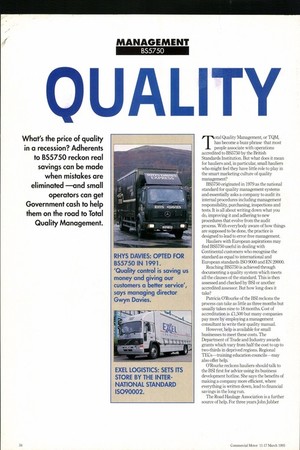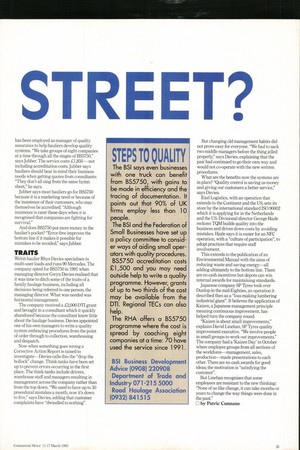QUALITY STREET?
Page 36

Page 37

If you've noticed an error in this article please click here to report it so we can fix it.
What's the price of quality in a recession? Adherents to BS5750 reckon real savings can be made when mistakes are eliminated —and small operators can get Government cash to help them on the road to Total Quality Management.
Total Quality Management, or TQM, has become a buzz phrase that most people associate with operations accredited to BS5750 by the British Standards Institution. But what does it mean for hauliers and, in particular, small hauliers who might feel they have little role to play in the smart marketing culture of quality management?
BS5750 originated in 1979 as the national standard for quality management systems and essentially asks a company to audit its internal procedures including management responsibility, purchasing, inspections and tests. It is all about writing down what you do, improving it and adhering to new procedures that evolve from the audit process. With everybody aware of how things are supposed to be done, the practice is designed to lead to error-free management.
Hauliers with European aspirations may find BS5750 useful in dealing with Continental customers who recognise the standard as equal to international and European standards ISO 9000 and EN 29000.
Reaching 13S5750 is achieved through documenting a quality system which meets all the clauses of the standard. This is then assessed and checked by BSI or another accredited assessor. But how long does it take?
Patricia O'Rourke of the BSI reckons the process can take as little as three months but usually takes nine to 18 months. Cost of accreditation is £1,500 but many companies pay more by employing a management consultant to write their quality manual.
However, help is available for small businesses to meet these costs. The Department of Trade and Industry awards grants which vary from half the cost to up to two-thirds in deprived regions. Regional TECs—training education councils—may also offer help.
O'Rourke reckons hauliers should talk to the BSI first for advice using its business development hotline. She says the benefits of making a company more efficient, where everything is written down, lead to financial savings in the long run.
The Road Haulage Association is a further source of help. For three years John Jubber has been employed as manager of quality assurance to help hauliers develop quality systems. "We take groups of eight companies at a time through all the stages of BS5750," says Jubber. The service costs £1,850 —not including accreditation costs. Jubber says hauliers should bear in mind their business needs when getting quotes from consultants: "They don't all sing from the same hymn sheet," he says.
Jubber says most hauliers go for BS5750 because it is a marketing need or because of the insistence of their customers, who may themselves be accredited: "Although insistence is rarer these days when it is recognised that companies are fighting for survival."
And does BS5750 put more money in the haulier's pocket? "Error-free improves the bottom line if it makes it possible for mistakes to be avoided," says Jubber.
TRAITS Welsh haulier Rhys Davies specialises in multi-user loads and runs 90 Mercedes. The company opted for 13S5750 in 1991 when managing director Gwyn Davies realised that it was time to ditch some of the traits of a family haulage business, including all decisions being referred to one person, the managing director. What was needed was horizontal management.
The company received a £2,000 DTI grant and brought in a consultant which it quickly abandoned because the consultant knew little about the haulage business. Davies appointed one of his own managers to write a quality system embracing procedures from the point of order through to collection, warehousing and despatch.
Now when something goes wrong a Corrective Action Report is raised to investigate—Davies calls this the "drop the bollock" change. Think-tanks have been set up to prevent errors occurring in the first place. The think-tanks include drivers, warehouse staff and managers resulting in management across the company rather than from the top down. "We used to have up to 30 procedural mistakes a month, now it's down to five," says Davies, adding that customer complaints have "dwindled to nothing".
But changing old management habits did not prove easy for everyone. "We had to sack two middle managers before the thing jelled properly" says Davies, explaining that the pair had continued to go their own way and would not co-operate with the new written procedures.
What are the benefits now the systems are in place? "Quality control is saving us money and giving our customers a better service," says Davies.
Exel Logistics, with an operation that extends to the Continent and the US, sets its store by the international standard ISO 90002 which it is applying for in the Netherlands and the US. Divisional director George Hazle reckons TQM builds quality into the business and drives down costs by avoiding mistakes. Hazle says it is easier for an NFC operation, with a "culture of participation", to adopt practices that require staff involvement.
This extends to the publication of an Environmental Manual with the aims of reducing waste and saving energy—all adding ultimately to the bottom line. There are no cash incentives but depots can win internal awards for maintaining standards.
Japanese company SP Tyres took over Dunlop in the mid-Eighties, an operation it described then as a "loss-making lumbering industrial giant". It believes the application of Kaizen, a Japanese management principle meaning continuous improvement, has helped turn the company round.
"Kaizen is about small improvements," explains David Linehan, SP Tyres quality improvement executive. 'We involve people in small groups to work out improvements." The company had a `Kaizen Day' in October where employee groups from all sections of the workforce—management, sales, production—made presentations to each other. There are no cash awards for good ideas; the motivation is "satisfying the customer".
But Linehan recognises that some employees are resistant to the new thinking. "None of us like change, it can take months or years to change the way things were done in the past."
by Patric Cunnane
















































































